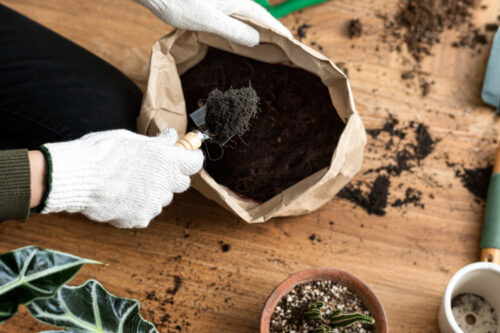A Guide To Using Compost, Soil, and Bark In Your Garden
Soil is essential for your plants to thrive in your garden, providing it will all the nutrients it needs to survive. Let us provide you with some great tips on how to get the most out your soil.
Just like any living thing, plants need the right combination of nutrients in order to thrive. Plants get these nutrients from soil, which is one of the most important aspects of your garden in terms of its impact on the health of your plants. In this guide, we’ll take a look at how you can get the most out of your soil, providing you with plenty of great tips along the way.
Soil Vs Compost: What’s the difference?
Many people tend to use soil and compost interchangeably, but it’s extremely important to understand the difference between them if you want to enjoy the fruits (and vegetables, and plants!) of your labour. Soil is perhaps the more complex of the two, so let’s begin there. Essentially, soil is the top layer of the Earth, and is enormously important for all life on our planet. Think of it as the bottom of our food chain; plants eat the soil, animals eat the plants, and humans, unless they’re vegetarian, eat the animals.
Soil is made up of all kinds of minor materials, including sand, minerals, silt, decomposed matter, gas, and liquid. Lots of things your plants will love, basically! There are several different types of soil, but the main ones are sand, silt, and loam. Out of the three, loam is the best because it is packed full of nutrients and drains exceptionally well while still maintaining enough water to feed your plants. Sandy soil is too gritty and dry, while silty soil has the opposite negative in that it retains too much water. If you already have loamy soil in your garden - great! If you don’t then don’t despair, there are numerous products you can buy to improve your soil. We stock Westland Top soil, a specially selected rich clay loam soil with a high humus content, which is great at retaining nutrients and moisture.
Composts, on the other hand, are made up entirely of decomposed organic matter, such as dead plantlife, food, and other organic waste. They’re also incredible fertilisers because they are packed with nutrients - more so than soil. While good quality soil is the perfect material to plant your seeds and bulbs, composts like Westland New Horizon All Plant Compost, should be sprinkled on top or mixed into the soil to provide additional necessary nutrients.
What About Bark?
Bark serves many purposes and is often used by home gardeners as a decorative material. To make bark, producers mechanically remove the bark from softwood trees such as pine, spruce, fir and redwood. Once it has been removed from the trees, it is shredded or graded for use as a landscape material. Bark is available in a range of sizes, usually processed into chunks, granules or shredded material. Bark has multiple uses and can be purchased at any garden retailer. You may see that there are different types of bark (bark mulch, landscaping bark etc). Essentially, they are the same but have minor differences, for example play-grade bark has less white wood content which makes it softer.
Not only does bark enhance the appearance of your garden, but it can help to extend the life of your plants. When bark is applied to beds, borders and pots it regulates the soil temperature and protects the plants from the extremes.
Bark is also a cheap alternative to more expensive hard pathway materials like paving or gravel. If you use bark for paths, it gives a different texture to the garden and is durable and low maintenance. There are many grades of weed suppressant fabrics which are great to use to create a membrane between the soil and bark.
When purchasing bark, you can further help protect the wider environment by ensuring you buy bark from reputable retailers that have ensured the wood has come from a renewable source. This should be clearly labelled, just look for the FSC Certification (Forest Stewardship Council), just like our Westland Landscape Bark.
Bark comes in different grades depending on what you intend to use it for, the same applies to the different types of membranes to lay underneath. Thick membranes will prevent growth underneath but will hold water and weed proof-membranes will prevent the growth of weeds but will allow water to reach soil underneath. So, do you need a membrane? The answer to this question depends on where you want to use it!
Forward Builders Supplies
We hope that you found this guide helpful and interesting. Navigating the world of soil and compost can be a little confusing at first, but once you know the basics then you’ll be well on your way to being an accomplished gardener!
Here at Forward Builders, we have everything you need to get started on a new garden project. We have a large range of composts and soils perfectly suited for your plants, as well as mushroom compost, barks for both mulch and play areas, tools, landscaping supplies, and much more. All you see online is available for delivery, and if you’re local, we’ll even deliver for free with no minimum order required. You can reach us on 033 0055 2500, or fill in an online contact form and we will be in touch as soon as we can. To everyone venturing out into their garden this year: good luck and have fun!










The information below is required for social login
Login
Register
Fill in the form below to create your new account